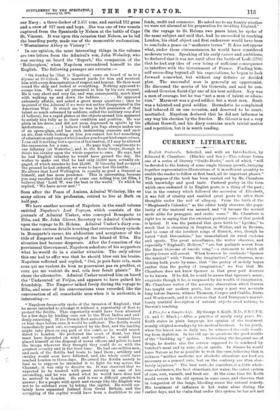CURRE NT LITERATURE.
English Pastorals. Selected, and with an Introduction, by Edmund K. Chambers. (Blackio and Son.)—This volume forms one of a series of literary " Guide-Books," each of which " will be devoted to the history of some single literary growth, bringing together representative illustrations of it in sufficient quantity to enable the reader to follow at first hand, all its important phases." The purpose of the book has been carried out by Mr. Chambers with knowledge and good taste. Pastoral poetry in the form which once endeared it to English poets, is a thing of the past ; but in the century which followed the accession of Elizabeth, it was full of vitality and enabled great poets to utter their thoughts under the veil of allegory. From the birth of the " Shepheard's Calender," as the editor truly observes, the popu- larity of the pastoral was assured, and " it became the normal mode alike for panegyric and erotic verse." Mr. Chambers is right too in saying that the sweetest pastoral verso of that period is lyrical. It was the pastoral that gave birth to " Lycidas," to much that is charming in Drayton, in Wither, and in Browne, and to some of the loveliest songs of Herrick, who, though he hated "dull Devonshire," has immortalised its rural customs and sports. The great miscellanies, the writer observes, and especially " England's Helicon," "are but garlands woven from the finest blossoms of bucolic song,"—a statement to which all poetry-lovers will assent. When however he contrasts "Spenser the musical" with "Donne the imaginative," and observes, men- tioning both poets by name, that " the poetry of melody began earlier than the poetry cf imagination," we fear that Mr. Chambers does not know Spenser as that groat poet deserves to be known. If he did, he would be aware that Spenser's music, exquisite though it be, is surpassed by his wealth of imagination. Mr. Chambers writes of the accurate observation which Darwin has taught our modern poets, but many a poet was accurate long before Darwin, witness Thomson, Cowper and Crabbe, Burns and Wordsworth, and it is obvious that Lord Tennyson's marvel- lously truthful description of natural objects owed nothing to Darwin's teaching.


















































 Previous page
Previous page